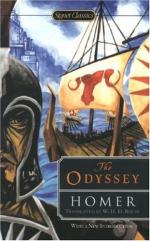“Sir,” answered Telemachus, “it has been very kind of you to talk to me in this way, as though I were your own son, and I will do all you tell me; I know you want to be getting on with your voyage, but stay a little longer till you have taken a bath and refreshed yourself. I will then give you a present, and you shall go on your way rejoicing; I will give you one of great beauty and value—a keepsake such as only dear friends give to one another.”
Minerva answered, “Do not try to keep me, for I would be on my way at once. As for any present you may be disposed to make me, keep it till I come again, and I will take it home with me. You shall give me a very good one, and I will give you one of no less value in return.”
With these words she flew away like a bird into the air, but she had given Telemachus courage, and had made him think more than ever about his father. He felt the change, wondered at it, and knew that the stranger had been a god, so he went straight to where the suitors were sitting.
Phemius was still singing, and his hearers sat rapt in silence as he told the sad tale of the return from Troy, and the ills Minerva had laid upon the Achaeans. Penelope, daughter of Icarius, heard his song from her room upstairs, and came down by the great staircase, not alone, but attended by two of her handmaids. When she reached the suitors she stood by one of the bearing posts that supported the roof of the cloisters {8} with a staid maiden on either side of her. She held a veil, moreover, before her face, and was weeping bitterly.
“Phemius,” she cried, “you know many another feat of gods and heroes, such as poets love to celebrate. Sing the suitors some one of these, and let them drink their wine in silence, but cease this sad tale, for it breaks my sorrowful heart, and reminds me of my lost husband whom I mourn ever without ceasing, and whose name was great over all Hellas and middle Argos.” {9}
“Mother,” answered Telemachus, “let the bard sing what he has a mind to; bards do not make the ills they sing of; it is Jove, not they, who makes them, and who sends weal or woe upon mankind according to his own good pleasure. This fellow means no harm by singing the ill-fated return of the Danaans, for people always applaud the latest songs most warmly. Make up your mind to it and bear it; Ulysses is not the only man who never came back from Troy, but many another went down as well as he. Go, then, within the house and busy yourself with your daily duties, your loom, your distaff, and the ordering of your servants; for speech is man’s matter, and mine above all others {10}—for it is I who am master here.”
She went wondering back into the house, and laid her son’s saying in her heart. Then, going upstairs with her handmaids into her room, she mourned her dear husband till Minerva shed sweet sleep over her eyes. But the suitors were clamorous throughout the covered cloisters {11}, and prayed each one that he might be her bed fellow.




